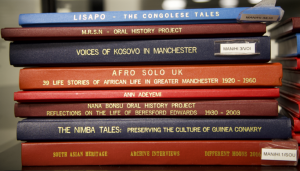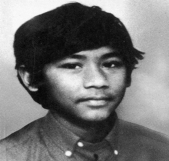
PGCE Historians – decolonising the curriculum through digital archives
On October 6th, PGCE Historians took part in a collaboration with Maya Sharma, Collections Access Officer at the Ahmed Iqbal Ullah Race Relations Resource Centre, which is based in Manchester’s Central Library. Adam Cooke, Widening Participation Coordinator for The University of Manchester Libraries, also joined us to take part in a session that centred on locating and using archives to put ‘hidden histories’ at the centre of planning a historical enquiry.
Maya Sharma describes the session below:
‘Our organisation is named after Ahmed Iqbal Ullah, a boy of Bangladeshi heritage who was killed in racially motivated playground incident in Manchester. To this day, it’s shocking to think that a young boy was killed in the place where he should be safe to grow, develop knowledge, confidence and identity. Our founders’ vision was for a library and archive that would not only have huge research value, but also be instrumental in celebrating cultures, combating racism and helping communities to tell their own stories. Ultimately, they hoped, this would prevent incidents like Ahmed’s murder.

Ahmed Iqbal Ullah
Given our origins, I was delighted to contribute to this session. We strongly believe that anti-racist teaching is key to our vision. Being able to work with PGCE History trainees is the perfect opportunity for us to contribute to building their confidence to decolonise the classroom and curriculum, and to offer resources to do so.
In my session I gave a very brief introduction to the National Archives; trainees were then tasked with finding records to base lessons on. I was really impressed by how quickly they managed to find interesting records that would enable them to teach in decolonised ways – centring the often-marginalised voices, teaching the real legacy of colonialism, and challenging some of the dominant (and racist) discourses that are still perpetuated in some school teaching today. I felt confident that this cohort of trainees would do their best to make the National Curriculum work for everyone rather than tell a limited story.
I’m really looking forward to joining the trainees at a later point and have already had some volunteers to support the Ahmed Iqbal Ullah RACE Centre in our work. This dialogue between the Education department, the trainee History teachers and the AIU RACE Centre is a great example of a collaboration which should have a real impact on tomorrow’s teaching.’

A trainee’s eye view of the session with Emma Hollis, PGCE History: The PGCE History group’s seminar with Maya Sharma and Adam Cooke came as part of an extended examination of decolonisation and the representation of BAME histories in curriculum planning. It was a privilege to learn first-hand about the Ahmed Iqbal Ullah RACE Centre (my first time engaging with them) and to hear about the work they do within the community. As we hope to do for our students, it was incredibly useful to engage with a local resource on decolonisation and diversity to make these perspectives relevant to ourselves and our surroundings.
Maya described decolonisation not just as ‘putting in’ certain perspectives in a curriculum, but a process of dismantling structures within that curriculum and interrogating why certain histories have been suppressed and hidden. We explored the two notions of decolonising and diversifying History curricula and were able to identify limitations within the latter approach; in simply diversifying History curricula we run the risk of tokenism. Rather, we discussed the need to put BAME histories at the centre of our enquiry planning in order to create a curriculum that is decolonised.
Maya modelled the process of searching digital archives, and we followed this with group work in which we searched the National Archives catalogue for sources to base a historical enquiry on. We were thrilled to identify brilliant sources such as Windrush passenger lists, bureaucratic documents from the British High Commission in Ghana, and a range of written and pictorial primary source material. We used these documents as the basis for a lesson planning activity focusing on colonial and migration histories, and began to build a collective source bank for our later teaching experience on placements. As a passionate advocate for the use of archives, Maya was an inspiring presence and we are looking forward to future collaboration with her on future projects.
As an Australian, having moved to the UK only a couple of months ago, I have developed a particular interest in the National Curriculum and was intrigued to find so many histories seemingly ignored within it. Australian histories don’t even feature in it- there is not a mention of my part of the southern hemisphere! Current debates about how and where to decolonise the curriculum seem interesting and timely.
I think it’s time that diverse histories, such as LGBT+ and BAME histories, take a more prominent role in the curriculum. After all, an inclusive reading of the past is essentially a rigorous and historically accurate reading of the past. In essence, inclusive History teaching is good History teaching. As a former Archival assistant I also know the incredible value of archives as the foundation of good, source-based history, and how archival materials can connect young people with distant pasts. I look forward to engaging more with the Ahmed Iqbal Ullah RACE Centre as the year progresses.’
Another Trainee’s Perspective from Julia Morton, PGCE Historian: ‘2020, for various reasons, has been eye-opening to say the least. The murder of George Floyd on May 25th this year, as I’m sure everybody is aware, sparked mass protest across the country and brought the way history is taught in schools to the forefront of a wider debate regarding anti-racist activism and how Britain reflects on its own past. I, a woman from a White British background, have recognised throughout my education the racial inequalities of Britain from the period of the slave trade and abolition, yet when looking at the issue of modern racism as a student, we focussed on the 20th Century Civil Rights movement in the USA, rather than modern Britain. There has been a tendency in the British curriculum to focus lessons on anti-racism and racial inequality on these two topics, failing to address the racism and inequality that occurs in Britain today.
Maya Sharma, from the Ahmed Iqbal Ullah Centre, helped to cement the thought in my mind that anti-racism is an extremely important element of education, which young people should be receiving on a compulsory basis as part of the National Curriculum. The National Curriculum is too-often dominated by British triumphant narratives and an ignorance of non-white, non-western culture. Maya emphasised the importance of amplifying the voices of non-white people throughout our future teaching careers, not just through a lens of oppression and injustice, but a lens of rich culture, traditions, and individuals.
Through a dive into the online National Archive as a cohort, we recognised the importance of oral testimonies as a valuable type of source to lead a broad enquiry question. Oral testimonies do exactly what Maya recommended with regards to amplification of non-white voices. The decolonisation of the history curriculum in schools is a mighty task, but the sessions we have had through University have assured me it is something I am able to assist with.’
Many of our PGCE subject groups are working on ways to address racism and our responsibility as teachers, and we would love to partner with schools and colleges from our Partnership in this work. Please get in touch with us through teachereducation@manchester.ac.uk or directly with the relevant subject tutor.





0 Comments